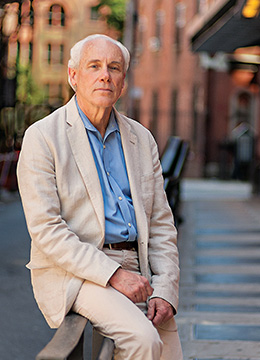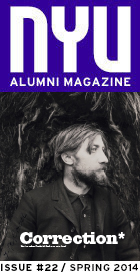fiction
Spooked
Peter Warner’s novel takes on Cold War spy games
by Nancie Clare
Would you know a spy if you met one? It’s a question that author Peter Warner (ARTS ’64) first confronted decades ago after an unassuming friend revealed, during a casual stroll through Frankfurt, that he’d been stationed there with the CIA startingin 1949.

“He’s a very brilliant man, an editor and novelist who, as a child, was a piano prodigy,” Warner recalls. “For all those reasons, he seemed to be the most unlikely spy.” But then Warner realized, it was precisely because of those qualities that his pal “could hide in plain sight.”
In that moment the idea for Warner’s sly new novel began to germinate. The Mole: The Cold War Memoir of Winston Bates (Thomas Dunne) follows the titular Bates, a failed poet languishing in post-WWII Paris when he is recruited by his motherland, Canada, to spy on the United States. Bates moves to Washington, D.C., becomes an American citizen, and ascends the ranks of a shadowy boys’ club of intrigue and espionage.
Crafted as a memoir complete with archival photos, footnotes, and an index, The Mole serves as an alternative history, in which “events stay the same, but the reasons things happen is changed,” Warner says. Bates throws back martinis and hurls gossip with key historical figures, from superlawyer Roy Cohn to President John F. Kennedy on his inauguration night. And because of his access to power, the accidental agent, often haplessly, meddles in such monumental events as the Suez Canal crisis, the U-2 spy plane incident, and the Bay of Pigs fiasco.
One of the book’s most intriguing ironies is that Bates, who is told when he’s recruited that he will be watched and contacted only when necessary, is unclear of what to do with the intel he gathers. He knows that he’s working for the Canadians, and $500 shows up in a bank account every month, but that’s about as far as his James Bond playbook goes.
Not that our protagonist is overly concerned. “He’s doing it for himself,” Warner explains. “He has almost no political ideology. He has plenty of opinions, but you can’t say he’s left wing or right wing. Nor is he motivated by a patriotic love of Canada.”
Our easygoing neighbor to the north has been of interest to Warner for nearly half a century. “Because of my age, I could have been Canadian,” Warner says. “I was vulnerable to the draft during the Vietnam War and, like many people, had a sense of, ‘Okay, if it comes to that, shall I go there?’ ” Warner, whose father earned his PhD at NYU and taught biochemistry at the medical school, escaped the fate of trading his greenbacks for loonies. Still, he thought, What if my life had taken that turn?
The question of selfness is also prevalent in The Mole. “Bates is half-Jewish, half-Christian, half-Canadian, half-American, and somewhat sexually ambiguous,” Warner notes. “So that was another reason for featuring Canada. [Canadians’] idea of identity has always been a slightly fraught issue.”
Warner began researching and fitfully writing the novel in the 1980s, while president of Thames and Hudson, the illustrated book publishing company. He finished only after retiring, so the fact that the topic of friends without privacy benefits has dominated recent headlines (think Barack Obama and Angela Merkel) is a happy coincidence. “I didn’t plan it,” Warner says with a laugh. “It all happened quite by chance, considering how long ago I started this book. But I’ve always assumed that allies spy on each other.”





